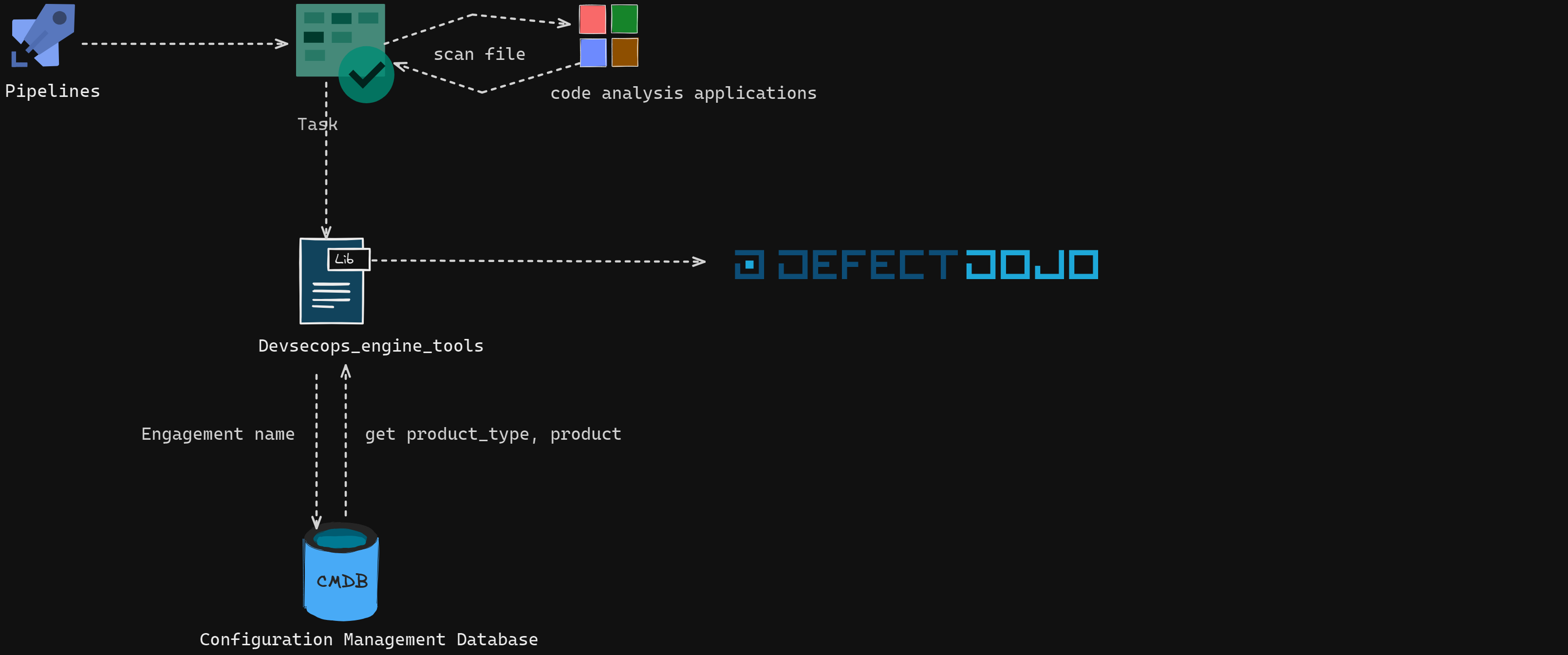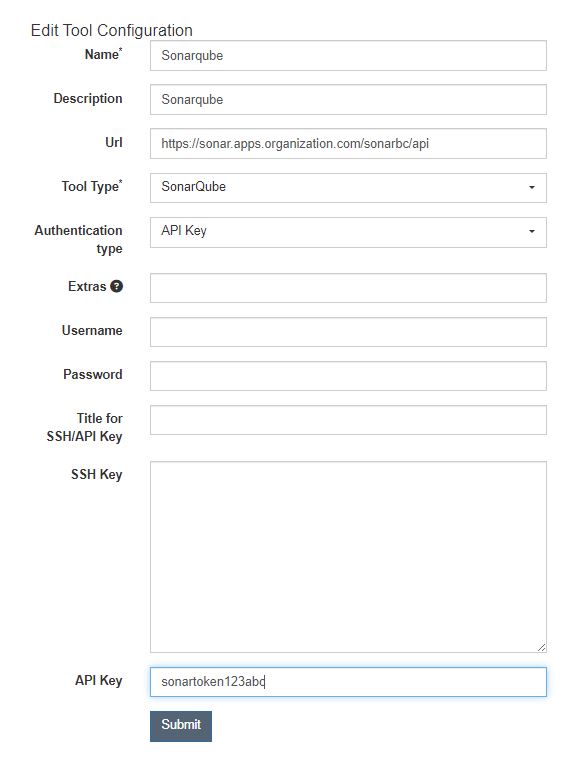Module Engine Utilities
Overview
The engine_utilities module provides a set of shared utilities, helpers, and adapters used across the DevSecOps Engine Tools platform. These utilities support logging, data transformation, session management, Git operations, SBOM handling, SonarQube integration, and more, enabling consistent and reusable functionality throughout the platform.
Main Responsibilities
- Azure Devops: Utilities and adapters for integrating with Azure DevOps, including helpers for authenticating with Azure DevOps services, managing pipelines, retrieving build and release information, and automating repository operations. These utilities enable seamless interaction with Azure DevOps APIs to support CI/CD workflows and project automation.
- Copacetic Integration: Utilities and adapters for integrating with Copacetic, including automated binary installation, container image patching, vulnerability report processing, and VEX (Vulnerability Exploitability eXchange) report generation. These utilities enable automated security patching of container images without requiring source code changes.
- Defect Dojo: Utilities and adapters for integrating with Defect Dojo, including methods for sending scan results, managing connections, and automating vulnerability imports.
- Data Transformation: Utilities for converting JSON responses to Python objects and vice versa, using domain language and dataclasses.
- Git Operations: Utilities for interacting with Git repositories, including pull request file discovery.
- GitHub: Utilities and adapters for integrating with GitHub, including helpers for authenticating with GitHub services, managing repositories, retrieving pull request and commit information, and automating repository operations. These utilities enable seamless interaction with GitHub APIs to support CI/CD workflows and project automation.
- Input Validation: Helpers for validating and sanitizing input data.
- SBOM Handling: Tools for generating, parsing, and managing Software Bill of Materials (SBOM).
- SonarQube Integration: Adapters and runners for collecting and reporting SonarQube analysis results.
- SSH: Utilities and adapters for managing SSH connections, executing remote commands, handling key-based authentication, and automating secure file transfers between systems.
- Logging: Advanced logger with color-coded output, file logging, and configurable verbosity.
- Session Management: Wrapper for HTTP session management to enable efficient and reusable requests.
- Error Handling: Utilities for standardized error reporting and exception management.
Key Components
utils/: Data transformation, logging, session management, and general helpers.git_cli/: Git operations and integration utilities.sbom/: SBOM generation and management tools.sonarqube/: SonarQube integration and reporting.input_validations/: Input validation helpers.trivy_utils/: Utilities for Trivy output parsing and management.copacetic/: Copacetic image patching, and VEX report generation.settings.py: Centralized configuration for utility modules.
Example Usage
Defect-Dojo-Lib Documentation
Architecture
The library communicates with different services, as illustrated in the following diagram:

Connection Configuration
To send information to Defect-Dojo, it is necessary to create a connection, which can be done using the Connect module. This module exposes functionality to create the connection object with other services integrated into the library.
The DefectDojo module exposes functionalities applicable to the Defect-Dojo app, such as the send_import_scan method that ingests data from vulnerabilities reported by external applications.
Example of Using the Defect-Dojo Module
import os
from devsecops_engine_tools.engine_utilities.defect_dojo import DefectDojo, ImportScanRequest, Connect
path_file = os.path.dirname(os.path.realpath(__file__))
if __name__ == "__main__":
os.environ["SYSTEM_TEAMFOUNDATIONCOLLECTIONURI"] = "https://dev.azure.com/organizaion/"
os.environ["SYSTEM_TEAMPROJECT"] = "project"
os.environ["SYSTEM_ACCESSTOKEN"] = "aidfjajia3249ajfdiadjfijtest"
request: ImportScanRequest = Connect.cmdb(
cmdb_mapping={"product_type_name": "","product_name": "nombreapp","tag_product": "nombreentorno","product_description": "","codigo_app": ""}
token_cmdb=settings.2398298jdfa89289uj389jr3atest,
host_cmdb="http://localhost:9000",
expression="",
token_defect_dojo="aijfiadsfoiajtest123",
host_defect_dojo="http://localhost:8000",
scan_type="Checkov Scan",
engagement_name="ABC_TestCode",
tags=["tag1","tag2"],
branch_tag="master",
remote_config_source="azure",
remote_config_repo="Repositorio",
remote_config_path="defect/cmdb_mapping.json",
)
response = DefectDojo.send_import_scan(request)
compact_remote_config_url : is the URL of the remote file (Azure repository) that must have the specified format.
"types_product": {
"engagement_name": "engagement_name_other",
"engagement_name": "engagement_name_other2",
}
cmdb_mapping is a configuration dictionary to relate keywords from information obtained from CMDB to the information that will be entered into Defect-Dojo. For example:
[
{
"engagement_name_cmdb": "engagement",
"producto_name_cmdb": "product",
"product_type_cmdb": "product_type",
"codigo_app": "test_129342",
}
]
- token_cmdb : Token that allows access to CMDB
- expression : Regular expression (string) to extract code from the repository.
- token_defect_dojo : Token generated by Defect-Dojo
- host_defect_dojo : URL where Defect-Dojo is deployed (for example, http://localhost.com:8000 for local execution).
- scan_type : Type of scanning or parser of Defect-Dojo to be used
The other parameters are configurable according to your needs and are equivalent to those received by the import_scan endpoint of Defect-Dojo, respecting the naming of the parameters and their data types. If you want to consult more information about the parameters that the method can receive, you can check the official documentation of Defect-Dojo endpoint import_scan here
Example of Sonar API Scan
This library supports the integration of Defect-Dojo via Sonar through API. In this specific case, it is not necessary to specify a file; Defect-Dojo connects to the Sonar API automatically as long as a prior configuration has been made..
- Creation of a tools-configuration:
In the following example, take into account the tools_configurations parameter, which is the object that allows the connection of Defect-Dojo with SonarQube. The expected value is an integer corresponding to the ID of the object in the database.
IMPORTANT
Note that for the tools_configurations parameter, the library takes the default value of 1.
request: ImportScanRequest = Connect.cmdb(
compact_remote_config_url=https://grupotest.visualstudio.com//_git/project?path=/directory/file.json,
cmdb_mapping={"product_type_name": "","product_name": "nombreapp","tag_product": "nombreentorno","product_description": "","codigo_app": ""}
token_cmdb=settings.2398298jdfa89289uj389jr3atest,
host_cmdb="http://localhost",
expression="",
token_defect_dojo="aijfiadsfoiajtest123",
host_defect_dojo="http://localhost:8000",
tools_configuration=1,
scan_type="SonarQube API Import",
engagement_name="ABC_TestCode",
branch_tag="master",
)
response = DefectDojo.send_import_scan(request)
Integration Tests
In this module, you will find the integration tests of the methods implemented in the library, which can also serve as documentation.
Navigate to the common_devsecops_lib directory and execute the following comman
python test_integrations_defect_dojo.py
Config lauch.json of vscode
{
"version": "0.2.0",
"configurations": [
{
"name": "Python: Integration test",
"type": "python",
"request": "launch",
"program": "${workspaceFolder}/tools/test_integrations_defect_dojo.py",
"console": "integratedTerminal",
"justMyCode": true
}
]
}
Data Transformation
Domain Language
This section is about how to transform a JSON file into Python objects and how we can use the utilities developed in this repository. First, we need to have a clear understanding of the structure of our JSON file, for example, if we have the following product_types in the following format:
{
"count": 1,
"next": null,
"previous": null,
"results": [
{
"id": 1,
"name": "product_type name test1",
"description": null,
"critical_product": false,
"key_product": false,
"updated": "2023-07-11T13:29:05.233277Z",
"created": "2023-07-11T13:29:05.233290Z",
"members": [
35
],
"authorization_groups": []
},
{
"id": 2,
"name": "product_type name test2",
"description": null,
"critical_product": false,
"key_product": false,
"updated": "2023-07-11T13:29:05.233277Z",
"created": "2023-07-11T13:29:05.233290Z",
"members": [
35
],
"authorization_groups": []
}
],
"prefetch": {}
}
This example is the response from an endpoint to query product_types from Defect-Dojo. Now, the question is, how can we translate this into the domain language? First, you need to import the FromDictMixin class, which implements some methods that allow us to perform the transformation into the domain language. Then, you should create a class that represents this response as follows:
import dataclasses
from typing import List
from devsecops_engine_tools.engine_utilities.utils.dataclass_classmethod import FromDictMixin
@dataclasses.dataclass
class ProductTypeList(FromDictMixin):
count: int = 0
next = None
previous = None
results: List[ProductType] = dataclasses.field(default_factory=list)
prefetch = None
To represent the list of *product_types*, it is necessary to create another class that represents that part of *JSON* as follows:
@dataclasses.dataclass
class ProductType(FromDictMixin):
id: int = 0
name: str = ""
description: str = ""
critical_product: bool = None
key_product: bool = None
updated: str = ""
created: str = ""
members: List[int] = dataclasses.field(default_factory=list)
authorization_groups: List[None] = dataclasses.field(default_factory=list)
If, for example, this ProductType class were within a Product, it would be necessary to create a Product class. It is important to clarify that it is not necessary to implement all the attributes, you can include only those you consider necessary.
With this, we are ready to make the transformation into the domain language
Using the from_dict method
To use the from_dict method, which is responsible for the JSON to Python object transformation, it is invoked as follows:
product_type_list_object = ProductTypeList().from_dict(response.json())
With this, we will have our first Python object serialized from JSON.
Using the to_dict method
This method is responsible for transforming a Python object into JSON.
product_type_list_dict = ProductTypeList().to_dict(objeto)
Logger
This utility allows extending the functionalities of the logger, such as changing the color depending on the logger type. It also enables logging to a text file when necessary.
A simple example of using this module is as follows:
from devsecops_engine_tools.engine_utilities.utils.logger_info import MyLogger
logger = MyLogger.__call__(**SETTING_LOGGER).get_logger()
logger.info("info message")
logger.warning("warning message")
logger.error("error message")
logger.critical("critical message")
Error-type loggers are displayed in red, warning-type in yellow, and others in white.
The variable SETTINGS_LOGGER has the following structure:
{
"debug": True,
"log_file": False
}
If the debug variable is active, the log messages will be displayed, otherwise, they will be deactivated.
If the log_file variable is active, a hidden ./log folder will be created, where logs will be recorded daily, separated by folders. Each folder will be named after the current date. In other words, a folder will be created daily, and within it, a log file will be created.
Session Manager
Usage of the session wrapped in the custom class:
session = SessionManager()
Example of a request using the session:
response = session.get('https://www.example.com')
Performing more requests using the same session:
response2 = session.post('https://www.example.com/submit', data={'key': 'value'})
Extensibility
- New utilities and adapters can be added to support additional tools, integrations, or data formats.
- Designed for reuse across all engines and modules in the platform.
Testing
- Unit tests are provided in the
test/directory, covering utility functions and adapters.
